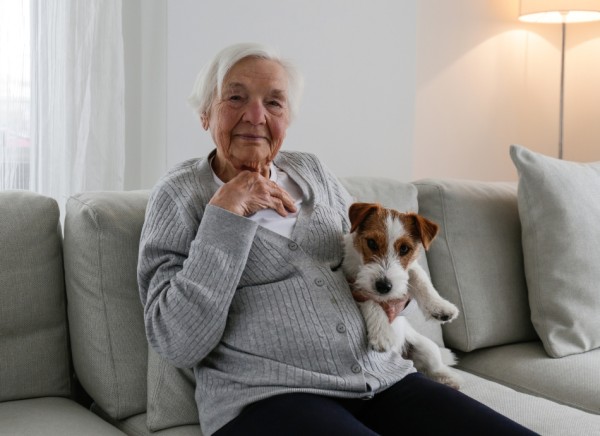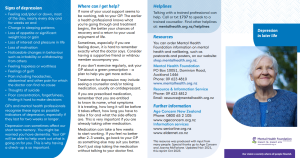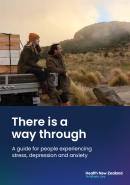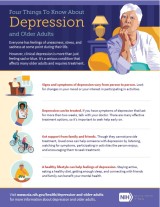You can now add Healthify as a preferred source on Google. Click here to see us when you search Google.
Depression in later life
Key points about depression in later life
- Depression (mate pāpouri) is a state of persistent and ongoing unhappiness that affects how you think, feel and act.
- It can develop in later life, but isn't a normal part of getting older.
- Depression in older people is common but it often goes undiagnosed and untreated.
- If you have ongoing feelings of low mood (wainuku), sadness (pōuritanga), hopelessness and loss of interest in life, talk to your healthcare provider.
- The sooner you get help, the sooner you'll start to feel better.

Depression in later life refers to depression that occurs after the age of 65. Many older people experience depression, but it’s often not diagnosed or treated.
Māori may describe it as wainuku (really low or down in the dumps) or whakamamae (emotional pain or distress). Depression and physical illness can both be factors in suicide for older adults. Men 85 years of age and above have one of the highest suicide rates in Aotearoa New Zealand.
Older adults often report more physical (tinana) symptoms than the psychological (hinengaro) symptoms usually associated with depression. Your healthcare provider may mistake these physical symptoms for part of the ageing process, which means you may not get accurately diagnosed with depression.
Tell your healthcare provider if you have constant feelings of low mood/wainuku for more than 2 weeks. Early diagnosis and treatment increase your chances of recovery.
Older people face a number of unique challenges, including significant lifestyle change, such as loss of a loved one, retirement and becoming less independent. These can lead to feelings of grief, loss and loneliness. Along with lack of money, the development of physical or mental health conditions and possible reaction to medicines, life challenges can increase the chance of becoming depressed later in life.
However, experiencing depression isn’t a normal part of getting older. Many older adults find meaning and purpose in their life and don’t experience depression.
Experiences increasing the risk of depression for people over 65 years of age
- Previous suicidal thoughts or attempts.
- A previous episode of depression.
- Chronic or severe physical illnesses such as vision and hearing loss, Parkinson’s disease, chronic pain, stroke, dementia or cancer.
- Loneliness and social isolation.
- Grief or loss (especially loss of a spouse or close loved one).
- Family history of depression or suicide attempts.
- Issues with misuse of alcohol or other substances.
- Poor sleep or insomnia.
- Lack of social support or meaningful activities.
- Responsibilities of caring for others (caregiver burden).
- Previous childhood trauma.
Moving into a care home may also make it more likely that you develop depression if you lose your usual familiar routines, independence or support networks.
Some medicines can be linked to depressed mood, for example some anticonvulsants, corticosteroids, Parkinson's medicines and beta blockers.
The signs of depression and grief can be similar. One difference is the feeling of sadness when you’re grieving compared with a feeling of numbness or almost ‘non-feeling’ if you’re depressed.
Grieving is a natural process that usually lessens over time. If you have persistent low mood and feelings of hopelessness which continue for months after a bereavement or loss, talk to your healthcare provider.
Depression is a state of persistent and ongoing unhappiness that affects the way you think, feel and act. Older adults often report more physical symptoms rather than the psychological ones, such as hopelessness, low mood, despair, negative thinking and worthlessness, that are usually associated with depression. Changes in behaviour including self-neglect or social withdrawal are also common.
Here are symptoms to look out for:
- Feeling sad all the time.
- Loss of interest in things and/or people.
- Unexplained aches and pains that don't go away, such as headaches, cramps or digestive problems.
- Sleeping problems.
- Eating more or less than usual.
- Slow movement or speech.
- Avoiding regular activities or social situations.
- Having difficulty concentrating.
- Feeling helpless or hopeless.
- Not being able to focus or make decisions.
- Feeling irritable or agitated.
- Lack of energy.
- Not looking after yourself including skipping meals, forgetting to take medication and not bothering to have a shower.
- Having thoughts of death or ending your life.
These are possible indicators of depression, but they may also be signs of a physical illness. If you or an older adult you know experiences these symptoms for more than 2 weeks, see your healthcare provider.
The earlier a diagnosis is made and treatment begins, the better your chances of recovery and a return to your usual activities and enjoyment of life.
Depression is often missed as an illness in older adults. This may be because older adults often report more physical complaints rather than the psychological ones more commonly associated with depression (see above). Additionally, behavioural changes may go unnoticed unless someone is observing changes in routine or self-care. If you have other mental or physical health problems it can be difficult to work out if you also have depression, or your depression may be incorrectly accepted as a normal part of the aging process.
Some older people see their healthcare provider regularly for physical aches and pains or because they’re lonely, and don’t recognise that this may be depression.
Depression might be missed because you:
- don’t want to ‘bother’ your healthcare provider about something that’s not a physical illness
- don’t mention depression and instead talk about vague symptoms
- have difficulty putting troubled feelings into words
- find it hard to recognise and accept emotions related to depression – this may be more difficult if you see it as a sign of weakness
- find it hard to accept that counselling can help when you're depressed
- are concerned that you might be ‘taken away’ or given treatment you haven’t agreed to
- already take several medicines and don't want to take more.
If you think you or someone you care for may have depression, there are online self-tests you or they can do, including the PHQ-9 (Patient Health Questionnaire 9) and the Kessler 10. These tests aren’t designed to make a diagnosis of depression, but they can be helpful to show that it's time to talk with family, friends or a healthcare provider.
If you have some of the symptoms mentioned above, it’s a good idea to see your healthcare provider. They will talk to you and assess you further to determine whether you have depression or another condition contributing to your symptoms.
Becoming depressed in later life may be a risk factor for, or an early sign of, dementia. Depression may affect your short-term memory and you may worry that you have dementia. Your healthcare provider will be able to work out what’s going on for you so it’s important to have a check-up.
Treatment for depression may include a combination of talking therapy, lifestyle changes and/or taking medication – usually an antidepressant. If there’s an underlying cause for your depression this will be treated. Your healthcare provider will also check any medicines you’re taking in case they’re causing your symptoms or making them worse.
There are also tohunga or healers who offer rongoā Māori services. Some people may consider alternative approaches, such as mindfulness meditation, or St John's wort. If you want to try St John's wort it's important to talk to your healthcare provider first as it can interact with other medicines.
Learning about how to look after yourself and knowing how to access support and find someone to talk to when you need help, can make a huge difference too.
Talk therapy (counselling or psychotherapy)
A number of psychological or talking therapy approaches have been found to be helpful for people with depression. Cognitive behaviour therapy (CBT) is a well-regarded therapy for depression and may be able to help you think more positively. Acceptance commitment therapy (ACT) can help you learn to accept difficult thoughts and focus on living a meaningful life. You can ask your healthcare provider to recommend someone or find a counsellor(external link) yourself.
There are also online courses that can help you with your thinking patterns, and with depression, anxiety, problem-solving skills and self-esteem, amongst other things.
Antidepressant medicines
Treatment with antidepressants is usually considered if you have moderate-to-severe depression and psychological therapy and lifestyle changes haven’t been enough to improve your symptoms. They work best when used together with talking therapy and lifestyle changes.
If you feel the medication isn’t working after 2 to 3 weeks, go back to see your healthcare provider as another medicine may suit you better.
Learn more about treatment for depression.
Rongoā Māori
Rongoā Māori is a traditional Māori healing approach. It includes herbal or medicinal remedies (rakau rongoā), physical therapies that are similar to massage and manipulation (eg, mirimiri or romiromi), spiritual healing, karakia and pastoral support and whitiwhiti kōrero (cultural support).
Find a rongoā Māori provider(external link).
Alternative approaches
Some complementary therapies may improve your quality of life and help you to feel better. In general, mindfulness, hypnotherapy, yoga, exercise, relaxation, massage, mirimiri massage and aromatherapy have all been shown to have some effect in reducing mental distress.
There are many things you can do to take care of yourself if you have depression.
Lifestyle changes
Looking after your physical health is an important way to improve your mental health. Improvements to your sleep, level of activity and diet, reducing your alcohol intake and avoiding recreational drugs, can greatly reduce your depression. If you don’t exercise regularly, ask your healthcare provider about a green prescription.
Many older people develop ways for dealing with times when they feel down. These include activities such as gardening, walking on the beach, visiting grandchildren, reading a good book, phoning friends or treating yourself to a small luxury. Pets can provide company and humour as well as a purpose in life. Just make sure you get a pet that suits your living situation and activity level.

Image credit: Canva
You may find comfort and meaning in spirituality or religious beliefs. These are all things that protect you from depression or help you make a successful recovery from it. Learn more about lifestyle changes and living well with depression.
Friends, whānau and community
Loneliness or social isolation are risk factors for depression. Look for ways to connect with family, friends, whānau and your community. This could be through volunteering, or joining a local exercise or community group.
Read more about loneliness and social isolation, including where you can get support.
Friends and whānau can be good medicine and having meaningful contact with others is of real value as it can help you engage more in social activities. You may find that doing things you enjoy, hobbies or voluntary work, contribute to a sense of worth and belonging in a community.
Sometimes, especially if you’re feeling down, it’s really hard to remember exactly what your healthcare provider says. Consider having a supportive friend or family member accompany you to any appointments. This can help if you have any hearing difficulties too.
Change and letting go
Understanding the context of ageing may be helpful. Where ageing is about taking on and accepting new and different roles where you may not be as actively included in the community as you once were. Change and letting go is a normal process but may at times be hard and sometimes painful. Having self-compassion and learning to accept new roles may be useful.
Learn more about self-compassion(external link).
Identity
Your identity can play a big role in your wellbeing. This can be influenced by your culture, where you live (eg, rural or urban), your sexuality or other factors such as being deaf or blind. For some groups, there will be shared challenges that contribute to their experiences of distress, and there are also some shared ways of getting through the hard times to enjoy life again.
Learn more about identity and depression(external link).
Apps reviewed by Healthify
You may find it useful to look at some depression apps, sleep apps, mental health and wellbeing apps and mediation and mindfulness apps.
If you or someone you know is in immediate danger, please call emergency services immediately on 111.
If you're affected by depression, it can help to have someone to talk to. You can start with your doctor, another healthcare provider or one of the following free helplines:
- 1737(external link) phone or text 24/7 to reach a trained counsellor
- Depression Helpline (0800 111 757)
- Lifeline (0800 543 354)
- Samaritans (0800 726 666)
- Suicide crisis helpline (0508 TAUTOKO or 0508 828 865).
Age Concern New Zealand(external link) has a visiting service(external link) that matches older people who are lonely or socially isolated with volunteers who are keen to spend time getting to know them. The volunteers are police-checked and trained, and spend about an hour each week sharing conversation and activities with their older friend. Phone 0800 652 105 to get in touch with your local Age Concern.
St John provides a caring caller service(external link) that connects people who need a friend with people who have time to listen and chat.
Our social isolation page also has valuable information and lists other organisations and services that can help support people who are feeling lonely.
Depression.org.nz(external link) is a New Zealand website that provides information about depression, where to get support, and tips for staying well.
There are also free Kaupapa Māori wellbeing services(external link) and Pacific-led wellbeing services(external link) available.
If an older person you know has depression, here are some things you can do to support them.
- Be a good listener and encourage them to get help if they haven’t already. Avoid saying things such as ‘you’ll get over it’ as this can make it harder for them to ask for help.
- Remember that they are an individual with unique life experiences, values and interests. Continue to take an interest in these as they get older.
- Talk with them about how you can be involved in their care and help them to do things for themselves so that they can maintain a sense of independence if this is what they’d like.
- Help them access an interpreter for appointments if English isn’t the language they’re most comfortable with.
- They may come from a culture or generation where there is stigma or lack of acceptance of mental illness so you could help them find a therapist who can explain depression and teach them about it.
- Help them find community or cultural groups for support. If they have a long-term condition, such as stroke, dementia or Parkinson’s, look for support groups they can join to share their experiences with others. Find out more about support groups or services for specific conditions.
Depression(external link) Age Concern, New Zealand
Mental health – can you tell if someone is struggling?(external link) BBC, UK, 2021
Brochures
Depression in later life(external link) Mental Health Foundation of New Zealand, NZ, 2025
There is a way through – a guide for people experiencing stress, depression and anxiety(external link) Health Promotion Agency, NZ, 2025
4 things to know about depression and older adults(external link) National Institute of Aging, US, 2023
Apps/tools
Patient Health Questionnaire (PHQ9)(external link)
General anxiety scale (GAD7)
Kessler scale
Depression apps
Mental health and wellbeing apps
Meditation and mindfulness apps
Sleep apps
References
- Depression in later life(external link) Mental Health Foundation of New Zealand, NZ, 2025
- Depression and older adults(external link) National Institute of Aging, NIH, US, 2025
- Depression in older adults Royal College of Psychiatrists(external link) UK, 2023
- RACGP aged care clinical guide (Silver Book) Part A – mental health(external link) Royal Australian College of General Practitioners, Australia
- Depression in adults and older persons(external link) Auckland Community HealthPathways, NZ, 2024 (updated 2025)
- Depression | Mate pāpōuri – frailty care guides(external link) Health Quality and Safety Commission, NZ, 2023
- St John's Wort and depression – in depth(external link) National Center for Complementary and Integrative Health, US, 2017
RANZCP clinical practice guidelines for mood disorders(external link) RANZCP, 2016 (updated 2020)
Psychological toolkit – practical resources to assist in the management of mood disorders(external link)(external link) Black Dog Institute, Australia
The role of medicines in the management of depression in primary care(external link) BPAC, NZ, 2021
Assessment and management of depression in older adults(external link) BPAC, NZ, 2011
Brief interventions – evidence-based support(external link) Te Pou, NZ
Video: Mental health in older adults – depression in the elderly (1:14)
(Goodfellow Unit, NZ, 2022)
Assessment tools
PHQ-9 (Patient Health Questionnaire 9)
Kessler-10 distress scale
General anxiety disorder scale (GAD-7)
See our page Depression for healthcare providers
Brochures

Mental Health Foundation NZ, 2025

Health Promotion Agency, NZ, 2022

4 things to know about depression and older adults
National Institute of Aging, US, 2023
Credits: Healthify editorial team. Healthify is brought to you by Health Navigator Charitable Trust.
Reviewed by: Dr Grace Lee, FRNZCGP and Clinical Educator
Last reviewed:





